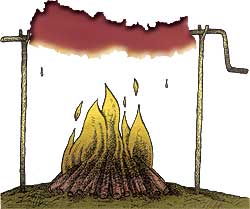 It last count, there have been 38 conflict resolution seminars in various five-star establishments in Kathmandu this year. To be cynical about it, we suppose these workshops do have some use in filling airline seats and hotel rooms when tourism is in a slump. One such seminar last week was an attempt to do a comparative study of the Sri Lankan situation vis-?-vis Nepal.
It last count, there have been 38 conflict resolution seminars in various five-star establishments in Kathmandu this year. To be cynical about it, we suppose these workshops do have some use in filling airline seats and hotel rooms when tourism is in a slump. One such seminar last week was an attempt to do a comparative study of the Sri Lankan situation vis-?-vis Nepal. The twin civil wars in Sri Lanka were on a different dimension of savagery. If a comparison were to be made with Nepal, it would be like having a full-scale separatist war going on in the tarai, with suicide bombers blowing up fully-loaded buses, setting off truck bombs in the middle of New Road at rush hour, destroying the entire Royal Nepal Airlines fleet at Kathmandu airport, and launching major assaults on army bases with hundreds of casualties. It would also mean having foreign peacekeeping troops arrive in Nepali territory to disarm the separatists, but being sucked into a war from which they are ultimately forced to retreat.
And all this would be happening while a parallel insurgency is wracking the hills, with waves of assassinations and reprisal killings by death squads that raze villages and send hundreds of bodies floating down the Trisuli every day.
That is what Nepal would be like if the violence that engulfed Sri Lanka since 1984 were to happen here. We know that things in Nepal aren't as bad. Sri Lanka's two simultaneous civil wars cost 85,000 lives in 17 years, in Nepal there have been 9,000 killed in eight years. So far, ours is a homegrown class war, not ethno-separatist and religio-patriotic uprisings. The level of weaponry is not as lethal in Nepal, and this has kept casualty levels relatively lower in our case.
But Sri Lanka offers us a warning of how badly things can spiral out of control. It shows us that ignoring genuine grievances of the people, and trying to give the other side a bloody nose to improve your bargaining position at the negotiation table can soon escalate into a war that takes on a lethal ethno-separatist tint.
Sri Lanka also offers lessons. If Sri Lanka can turn back from the brink, so can we. If political will can stop such deadly wars, there is no reason why we can't muster it. If minimum trust can restrain so much bad blood, we can build it too. If such polarised sides can begin the process of finding a compromise so can ours.
To be sure, as we heard from the Sri Lankan participants at the seminar, their peace process is still fragile. But it seems to have two things ours didn't: political will on both sides for a negotiated solution, and an international team of professional facilitators and monitors to keep the peace process on track.
Our last round of peace talks failed ostensibly because of a disagreement over the constituent assembly demand, which took us to the core of the structural problems that need to be fixed in our polity even if there was no war going on: the power of the monarchy and who controls the army.
But that bottom line is non-negotiable for both sides. Someone needs to tell the Nepali people how many of us need to be killed before a compromise can be found: 15,000? 25,000? 85,000? And whether at the end of it we will still have a Nepal.


